Alibaba is a global marketplace for entrepreneurs to source products from suppliers, in bulk, at competitive prices.
Like any online marketplace, however, it’s essential to understand how Alibaba works. Most importantly, you should know how to stay safe when working with new suppliers on Alibaba’s platform.
This post will walk you through the ins and outs of Alibaba, how to buy from it safely, and how to use it for a dropshipping business.
Before placing an order from a supplier on Alibaba, be sure to check the most recent information and safeguards for protecting your purchase.
What is Alibaba?
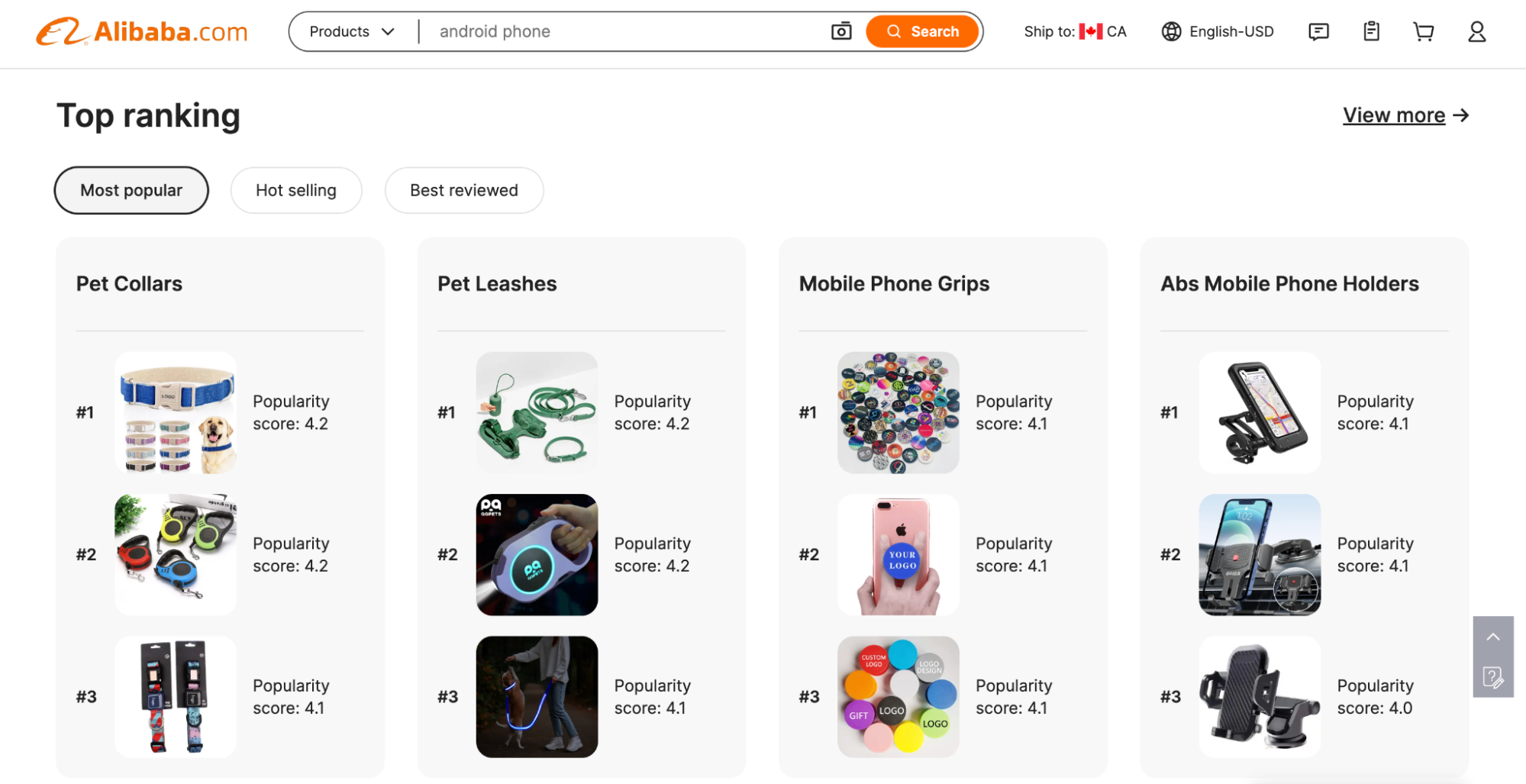
Alibaba is a Chinese-owned global wholesale marketplace. It’s one of the largest marketplaces in the world, generating more than $140 billion in revenue in 2024. With 200 million products from more than 200,000 suppliers, mostly based in Asia, Alibaba offers a huge directory for business buyers looking overseas.
Alibaba has a sister marketplace, AliExpress. While Alibaba is a B2B website for businesses that want to buy products in bulk, AliExpress is for consumers looking to buy individual products.
Is Alibaba legit?
Alibaba has been around for a long time. It’s a publicly traded company listed on the New York Stock Exchange. Its marketplace has a good reputation in the global ecommerce industry, and based on user reviews, a majority of suppliers on Alibaba are reputable and trustworthy.
However, it’s important to remember that you’ll be dealing with independent manufacturers who use the platform, so it’s up to you to vet each one that you do business with.
While Alibaba has safety features to protect users (such as its verified suppliers program), there are bad suppliers on the website. You need to follow best practices to protect yourself when making an order.
How does Alibaba work?
Alibaba is a wholesale marketplace for buyers looking to purchase large quantities of products at the lowest price. You can use Alibaba to negotiate directly with manufacturers, order custom products, add branding to private label products, and achieve significant cost savings by negotiating repeat orders.
Ecommerce store owners can also use Alibaba to find and communicate with suppliers who offer a dropshipping relationship.
For businesses looking to stock their inventory or set up dropshipping, Alibaba works like this:
- Search Alibaba for a product or supplier.
- Enter your order quantity and product specifications (colorways, sizing, customization, etc.).
- Contact the supplier to make manufacturing requests or negotiate shipping.
- Make payment and receive your order.
The exact steps for using Alibaba differ depending on whether you want purchase products or dropship them. Next, let’s look at how Alibaba works for these two use cases.
Buying from Alibaba: finding a safe supplier
If you want to stock your store’s inventory with ready-made or customized items, here’s how you can find a supplier for your ecommerce business.
1. Search for products and niches
Alibaba’s platform works like many other online marketplaces. Use the search bar to explore thousands of products across various categories.
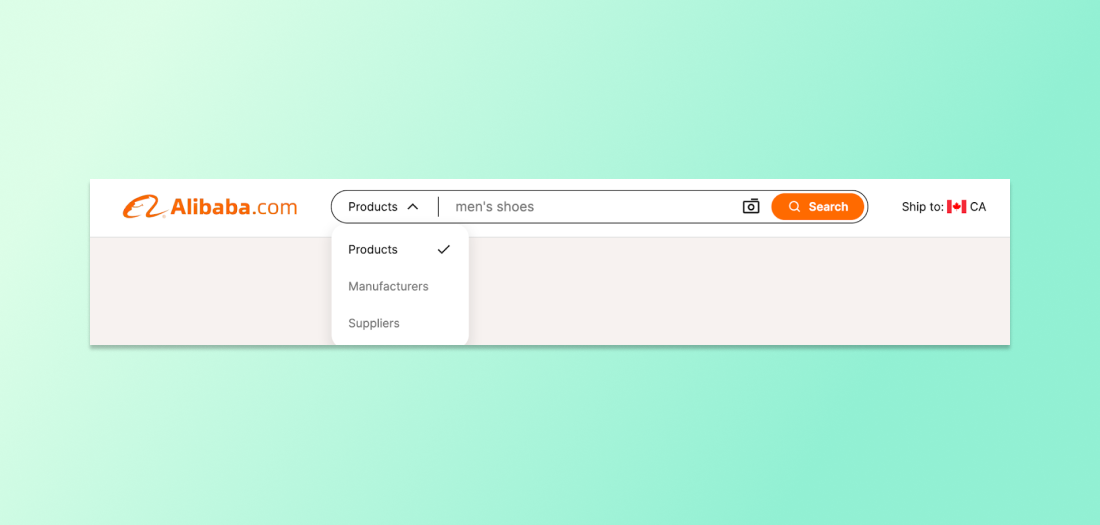
From the homepage, you can filter your search results by products, manufacturers, or suppliers.
- The product filter allows you to explore thousands of products across various categories.
- The manufacturer and supplier filters help you identify wholesalers that specialize in your items.
Once you’ve performed a search, use the filter tools in the sidebar to find suitable Alibaba suppliers for your needs and shipping location.
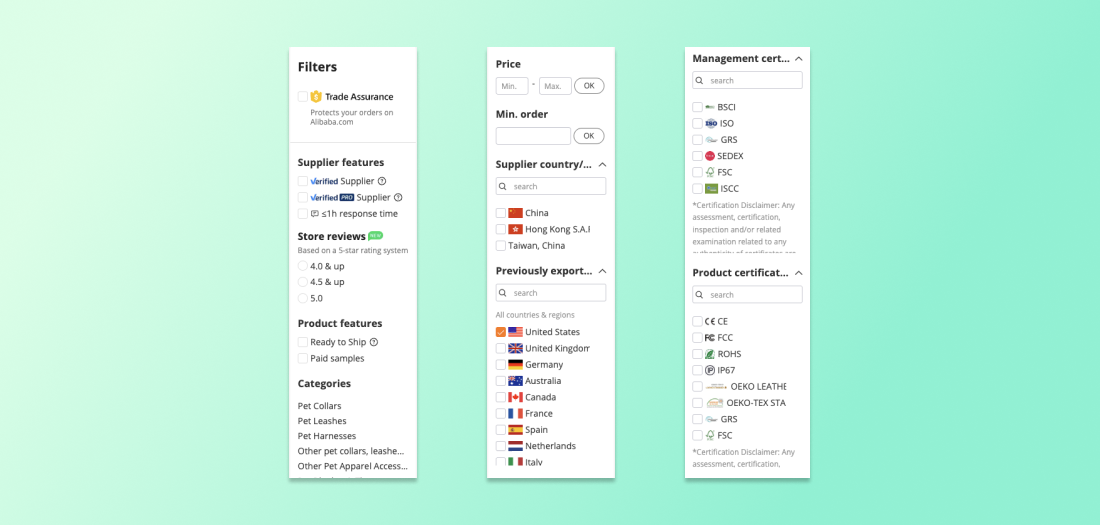
You can filter suppliers and manufacturers by a number of factors, including:
- Verification status
- Manufacturing certifications
- Response time
- Reviews
- Lead time
- Country of operation
- Countries previously exported to
- Materials used
- Minimum order quantity
Pay attention to a product’s number of orders and reviews, as well as a supplier’s ratings. Ensure suppliers are reliable by vetting testimonials from other buyers.
Consider placing a sample order for a first-hand look at product quality and supplier reliability.
2. Check minimum order quantity
When you’ve found an item you’d like to buy from Alibaba, there are a few things to look at on the product’s description page.
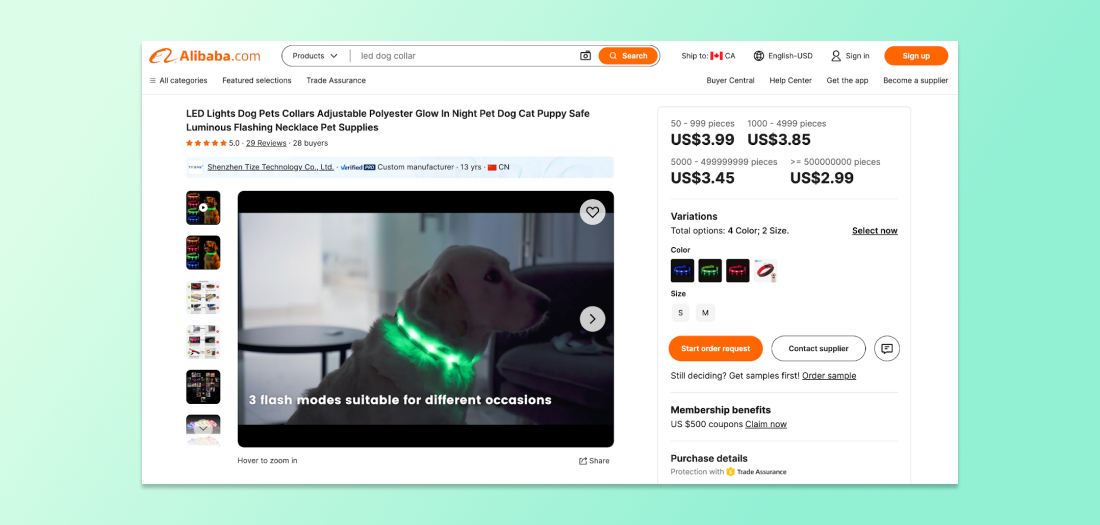
Minimum order quantity is the smallest order a manufacturer is willing to accept. In the example above, the minimum order is 50 units, shown in the top-right of the screen.
As you place larger orders, the cost per item charged by a supplier often goes down. Multiply the unit price by your order amount and add shipping costs to get an idea of your profit margins for a product.
3. Negotiate with the supplier
Your next step is to negotiate a deal with the supplier. This is your chance to ask for more information about the product, request any customization, and agree on shipping fees.
Negotiating is a big part of the Alibaba shopping experience. You talk directly with the supplier to get the best deal for you and your customers.
There are several ways to communicate with Alibaba suppliers. Once a relationship is established, many suppliers talk with buyers through the popular Chinese messaging app WeChat.
Inquiry form
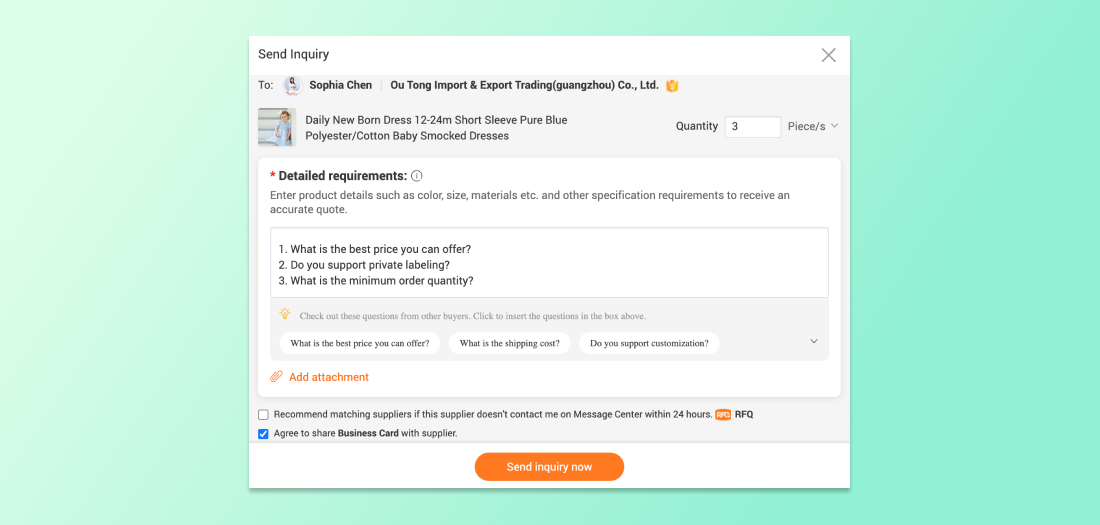
You can use Alibaba’s inquiry form to reach out to suppliers. To find it, click the Contact Supplier button on a supplier profile or product listing.
In the form, you can introduce yourself and your business, as well as ask specific questions about products, pricing, minimum order quantities, and any other details you need. Keep your language simple and clear, as many suppliers use translation tools to understand your message.
It can help to number your questions so suppliers can easily reply to each one. This keeps communication organized.
Request a quote (RFQ)
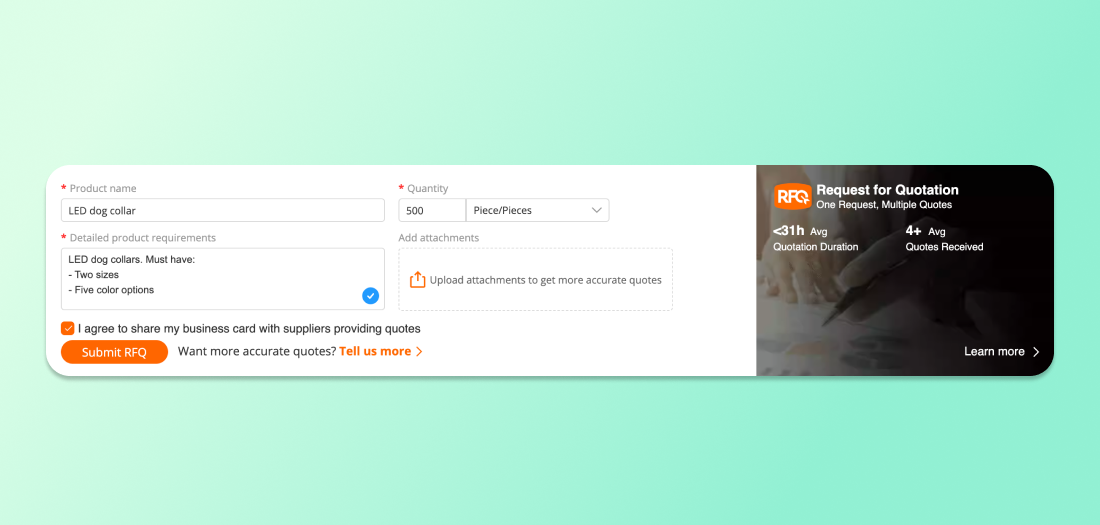
For larger orders, another way to initiate conversation is to request a quote.
When you request a quote (often referred to as RFQ) for a product, all suppliers of that item can send you pricing information. Using RFQ, you can save time sourcing and easily compare multiple supplier responses.
To start an RFQ, hit the Request for Quotation button on Alibaba’s homepage. You can ask for quotes for products you’ve previously browsed, write out requirements, or upload documents detailing product specifications.
Taking a few minutes to plan your RFQ or inquiry can make a big difference to the quality of replies you receive. Be simple and clear, but don’t be afraid to give detailed information, such as:
- Product specifications
- Specific packaging needs
- If you have a target price in mind
- How many units you’re looking to order
- Ideal production times
An RFQ is more than just a quest for the lowest price—it’s a tool to engage with potential suppliers and find a reliable partner.
4. Understand payment options
You’ll need to think about how best to pay your overseas supplier once a deal has been reached. Alibaba supports multiple payment methods—each with pros and cons for the buyer and seller.
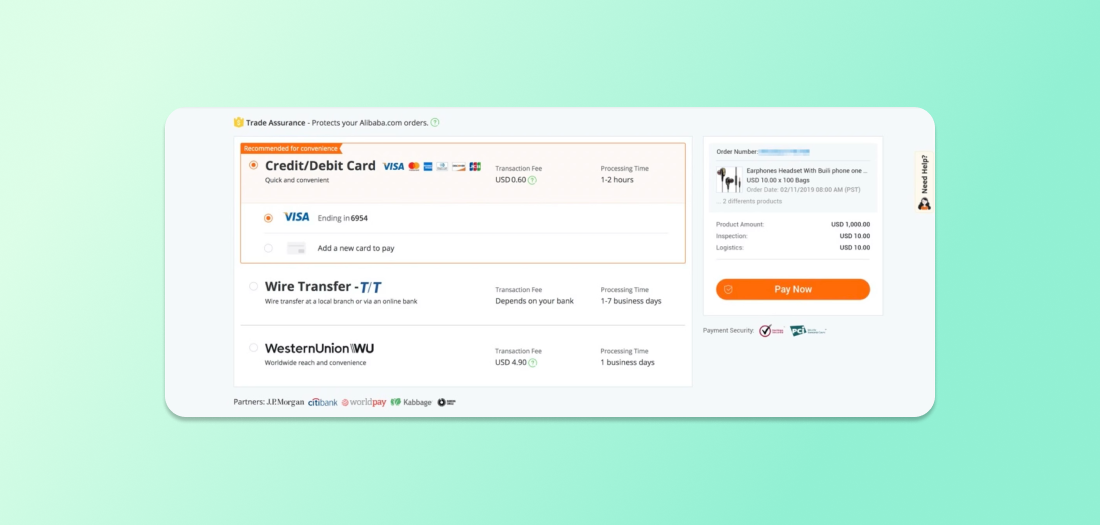
Alibaba Trade Assurance
Trade Assurance is Alibaba’s escrow service. It holds your payment and only releases it to the supplier once you confirm satisfactory receipt of your order. Trade Assurance can be used with credit card payments and wire transfers, and is a good option when starting out on Alibaba.
risk level: low
PayPal
PayPal is a user-friendly option that offers good buyer protection. However, it’s less favored by suppliers due to difficulties in withdrawing money, tax rates, and the risk of chargebacks.
risk level: low
Letter of credit
A letter of credit can be safe for both parties but involves complex procedures. It’s generally recommended for larger purchases ($20,000 and above).
risk level: medium
Bank transfer
Unless you use trade assurance or another form of escrow, bank transfers can mean the supplier receives full payment before production starts. This carries a high risk for the buyer and is not recommended when dealing with an unknown supplier, due to limited recourse if something goes wrong.
risk level: high
Western Union
Western Union is another risky payment method for the buyer and is not recommended unless the payment is protected by escrow.
risk level: high
Dropshipping from Alibaba: finding a reliable dropshipper
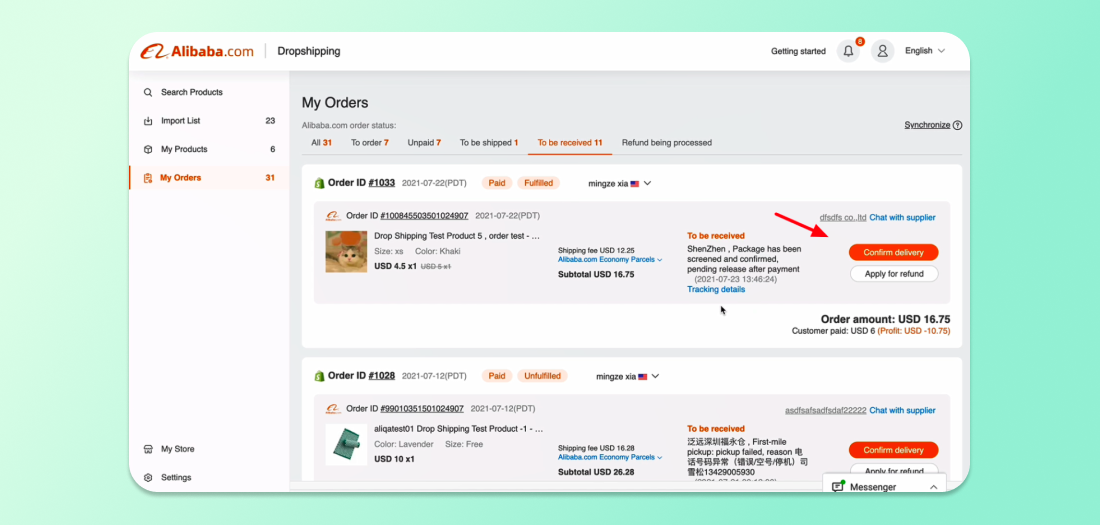
Effective dropshipping using Alibaba requires a slightly different method:
1. Use the Alibaba dropshipping portal
Head to Alibaba’s dedicated dropshipping portal. This will show you suppliers who are open to fulfilling individual orders, eliminating the need to meet minimum order quantities.
2. Connect your online store
Next, connect your online store to Alibaba. This integration allows you to push product information from Alibaba to your store, keep that information updated, and synchronize store orders.
If you’re using Shopify for your online store, connect your site through the My Store tab on Alibaba’s dropshipping portal.
3. Search for products and suppliers
Use the search bar to find dropshipping products that align with your niche. Again, you can refine search results with filters.
To find a profitable dropshipping niche on Alibaba, you’ll want to use the search functions to look for products with high consumer demand but low retailer competition.
Free tools like Google Trends can help you see product popularity over time. Steady interest is a good sign of a profitable niche, but you’ll also need to make sure there’s a workable profit margin.
4. Add products to your Import List
Once you’ve found products to dropship, add them to your import list. The Import List tab makes it easy to manage the products you want to sell online and sync them with your online store.
When you add products to your list, you can customize their titles, descriptions, images, and pricing. This information will be pulled to your online store and is visible to your customers.
With everything set up, orders made on your Shopify store will be visible in the My Orders tab.
From the My Orders tab, you’ll be able to:
- Confirm and pay for customer orders
- Cancel orders
- Track shipping statuses
- Confirm deliveries
- Request refunds
5 tips for staying safe on Alibaba
When it comes to shopping on Alibaba, safety is paramount. It’s important to know how to protect yourself and ensure you’re dealing with reliable suppliers.
Here are five key strategies to help you navigate Alibaba safely and confidently.
1. Use verified suppliers

Alibaba has its own verification program that authenticates high-quality suppliers.
Verification is based on inspection by third-parties and feedback from previous customers.
Verified suppliers are confirmed to possess all the necessary paperwork and licensing. An audit team also inspects the supplier’s facilities to assess the company’s operating conditions. They look at:
- Quality management and control processes
- Product certification
- Testing capabilities
- After sale product support
If a supplier is verified, you’ll see a widget on their landing page. Verified widgets can take the form of banners, pop-ups, or a tab on the supplier’s storefront:
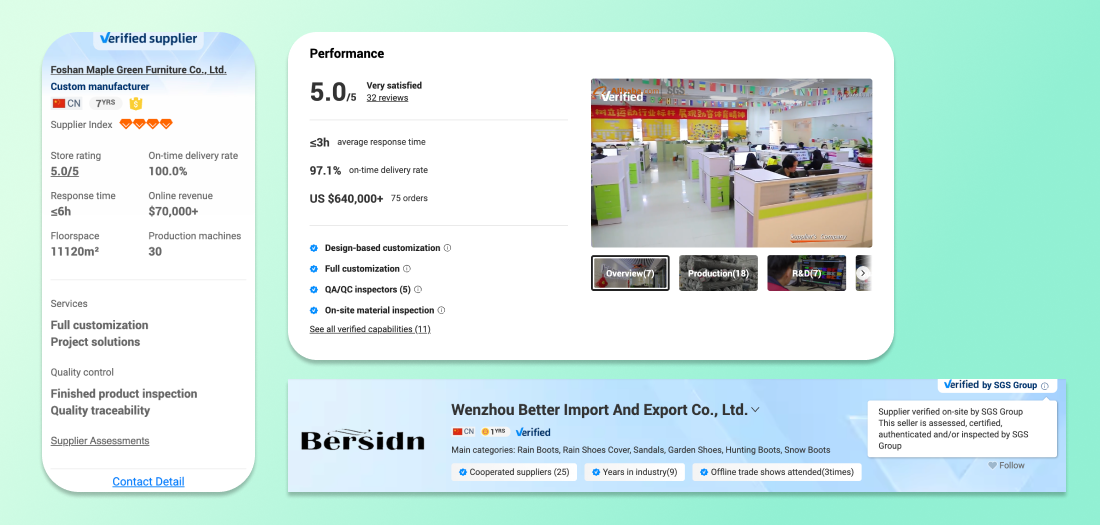
These sections contain information about the supplier’s performance history, as well as links to inspection reports and factory tour videos.
There are three types of verified suppliers on Alibaba:
- Verified custom manufacturers: They specialize in making unique, custom products.
- Verified multispecialty suppliers: They handle smaller orders, offer shipping solutions, and source various types of products. (You’ll likely use a multispecialty supplier if you’re a small business.)
- Verified brand holders: They provide access to well-known brands for reselling.
Looking for these verification badges is the first step to assessing whether a supplier is ready to ship for you.
You can filter suppliers by verified status when you search, or check for the verified logo on manufacturer profiles.
2. Utilize Alibaba's Trade Assurance service
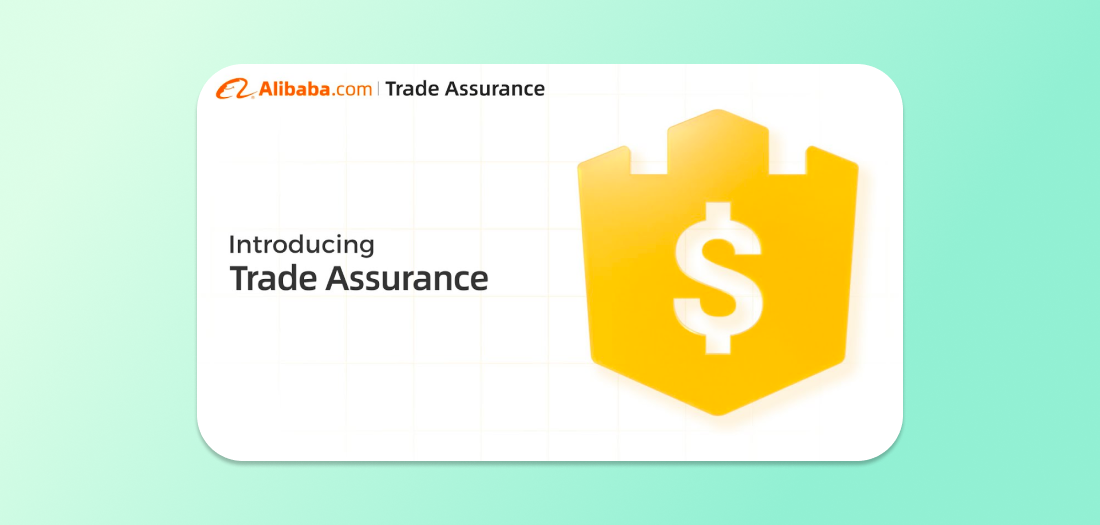
Trade Assurance is Alibaba’s free service for protecting payments and ensuring you receive the goods you order.
The service helps create a secure trading environment by protecting buyers’ orders if a supplier fails to meet the basic requirements of on-time shipment or quality of products.
When you’re ready to place an order, look for suppliers that support Trade Assurance. They’ll have the Trade Assurance icon on their profile, and you can filter search results by whether a supplier accepts Trade Assurance terms.
After negotiating with the supplier, you can place a Trade Assurance order. During this process, you’ll specify your product requirements, payment methods, and shipping details in a digital contract.
Your payment is then protected (held in escrow) by Alibaba until you confirm that you’ve received the goods as described in the contract.
If there’s a dispute between you and the supplier, you can claim a refund with Alibaba:
- Apply for a refund by selecting the order and detailing the issue.
- The supplier has two days to respond. They can agree, counter, or reject your claim.
- If no agreement is reached, you can escalate the dispute to Alibaba.
- Alibaba will review the case and make a judgment.
- If you paid via Trade Assurance and Alibaba rules in your favor, you’ll receive a refund.
Buyers in most countries can also return defective products locally for free.
3. Communicate with suppliers
Ask suppliers questions about their business and products. Look at reviews from other merchants to gauge their track record.
Buyers can check a supplier’s background by clicking Company Profile on product listings. The business information contained there often includes:
- Factory inspection reports
- Panorama photos or VR showrooms
- Trading capabilities (markets served, total annual exports)
- Conformity certificates (product test reports, patents, trademarks)
- R&D information (number of production lines, OEM/ODM customization services)
If you like the look of a supplier, try to get on a call with your contact.
Feel free to ask for whatever makes you feel more comfortable doing business. Does your supplier need to make efforts to be sustainable? Do they need to be able to provide custom packaging or branded invoices?
4. Use samples to check quality
You should get samples to check and verify product quality before you invest any significant amount of money into inventory. Many retailers will request additional samples under different names and email addresses to check product consistency.
5. Be willing to walk away
Finally, if a supplier’s offer seems too good to be true, it probably is. Be wary of shipping promises that seem fantastical or prices that differ significantly from other suppliers. Always be willing to walk away from a deal if it doesn’t feel right.
Pros and cons of using Alibaba for your business
One of the main reasons why retailers and dropshippers look for suppliers on Alibaba is to take advantage of low manufacturing costs.
Costs of manufacturing in Asia can be significantly less than in North America and other parts of the world, which is good news if you want to start a dropshipping business.
While cheaper product costs mean higher potential profit margins, Alibaba does come with pros and cons that you need to be aware of before developing an online business around this marketplace.
Pros of working with Alibaba suppliers
- Lower manufacturing costs
- Suppliers are open to working with small businesses and providing smaller quantities
- High number of suppliers to choose from
- Easy contact with Asian manufacturers, who may be the only producers of an item
Cons of working with Alibaba suppliers
- Product quality may be lower than from local manufacturers
- Products may be made under lower manufacturing and labor standards
- Almost no intellectual property protection
- Language and communication barriers
- Longer shipping times
- Product importing and customs clearance
- Lower-level of payment security and recourse than from local suppliers
Become an Alibaba dropshipper and safely source products
Sourcing wholesale goods via Alibaba suppliers is safe and reliable, both for retailers and dropshippers. As long as you follow basic safety practices, Alibaba offers a potentially profitable way to expand your business.
Remember: If a deal feels too good to be true, just walk away. There are usually a hundred other suppliers you can find with a few clicks. Happy sourcing!
Illustration by Pete Ryan
Read more
- How To Source Products To Sell Online
- Amazon Dropshipping Guide- How To Dropship on Amazon (2024)
- Product Ideas: 17 Places To Find Profitable Products
- 8 Types of Ecommerce Business Models that Work in 2024
- 6 Tips for How To Be a Successful Dropshipper (Full Playbook)
- 25+ Ideas for Online Businesses To Start Now (2024)
- How To Find a Product to Sell: 16 Proven Methods
- How to Build a Business Website for Beginners
- 8 Dropshipping Software for New Dropshippers
- Is Dropshipping Worth It in 2024?
How does Alibaba work FAQ
Does Alibaba do dropshipping?
Alibaba does support dropshipping. While Alibaba is primarily a wholesale marketplace, many of its suppliers offer dropshipping services. This means they will ship products directly to your customers on your behalf. Alibaba even has a dedicated dropshipping portal to connect you with suppliers.
Can anyone order through Alibaba?
Anyone can order through Alibaba, whether they’re an individual or a company. Alibaba lets you order bulk products from international manufacturers.
Can you get scammed on Alibaba?
There is a possibility you may get scammed from a supplier on Alibaba, similar to threats of fraud on other online marketplaces like eBay and Amazon. You should take the precautions described in this article when vetting Alibaba suppliers, such as looking for the Verified Supplier logo.
What’s the difference between Alibaba and AliExpress?
Alibaba and AliExpress are both online marketplaces of third-party sellers. The difference between Alibaba and AliExpress is that Alibaba is primarily for business-to-business transactions, while AliExpress is designed for consumers.
With Alibaba, you buy directly from the manufacturer and can request custom product designs. AliExpress items, on the other hand, are usually pre-made with limited customization options, and are typically more expensive.
Sellers on AliExpress also tend to offer ePacket shipping, which can help your ecommerce store deliver high-quality, validated products to customers, faster. Alibaba shipping times are typically longer.
Which is better for dropshipping: Alibaba or AliExpress?
The products you decide to sell online dictate which marketplace is better for dropshipping. If you want wholesale or custom white-label goods, Alibaba is a better option. If you want to dropship ready-made products without a minimum order, AliExpress dropshipping may be better for you.




